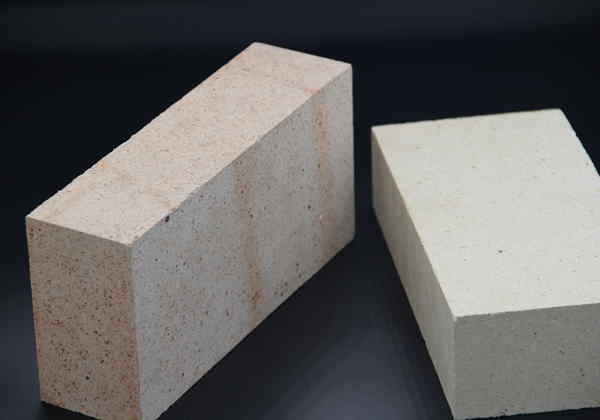
Fırnalarda kullanılan çeşitli refrakter tuğlalar vardır, her biri benzersiz avantajları ve dezavantajları ile.
Yangın kil tuğlaları kilden yapılır ve fırınlarda yaygın olarak kullanılır. Nispeten ucuzdurlar ve iyi termal şok direncine sahiptirler.
Yangın kil tuğlaları 1500 ° C'ye kadar sıcaklıklara dayanabilir ve hızlı sıcaklık değişikliklerinin meydana geldiği fırın alanlarında kullanım için uygundur.
Ateş Kil Tuğlaları iyi yalıtım özelliklerine sahip olun ve enerji verimliliğinin önemli olduğu fırın alanlarında kullanılabilir.
Kimyasal korozyona karşı dirençlidirler ve asidik ve temel ortamlara dayanabilirler.
Fakat, Yangın kil tuğlaları nispeten düşük mekanik mukavemete sahiptir ve mekanik strese maruz kalan fırın alanları için uygun değildir.
Ayrıca düşük refrakterleri var, yüksek sıcaklık uygulamalarında kullanımlarını sınırlayan.
Yüksek alümina tuğlalar yüksek saflıkta alüminden yapılmıştır ve yüksek sıcaklık uygulamalarında kullanım için uygundur.
Mükemmel termal şok direncine sahiptirler ve 1700 ° C'ye kadar sıcaklıklara dayanabilirler.
Yüksek alümina tuğlalar yüksek mekanik mukavemete sahiptir ve mekanik strese maruz kalan fırın alanlarında kullanım için uygundur.
Kimyasal korozyona karşı dirençlidirler ve asidik ve temel ortamlara dayanabilirler.
Yüksek alümina tuğlalar iyi yalıtım özelliklerine sahip olun ve enerji verimliliğinin önemli olduğu fırın alanlarında kullanılabilir.
Fakat, Diğer refrakter tuğlalara kıyasla nispeten pahalıdırlar.
Silikon karbür tuğlaları silikon karbürden yapılır ve yüksek sıcaklık uygulamalarında kullanıma uygundur.
Mükemmel termal şok direncine sahiptirler ve 1800 ° C'ye kadar sıcaklıklara dayanabilirler.
Silisyum karbür tuğlalar Yüksek mekanik mukavemete sahiptir ve mekanik strese maruz kalan fırın alanlarında kullanıma uygundur.
Kimyasal korozyona karşı dirençlidirler ve asidik ve temel ortamlara dayanabilirler.
Silikon karbür tuğlaları iyi yalıtım özelliklerine sahiptir ve enerji verimliliğinin önemli olduğu fırın alanlarında kullanılabilir.
Fakat, Diğer refrakter tuğlalara kıyasla nispeten pahalıdırlar.
Magnezya tuğlaları magnezyadan yapılmıştır ve yüksek sıcaklık uygulamalarında kullanım için uygundur.
Mükemmel termal şok direncine sahiptirler ve 1800 ° C'ye kadar sıcaklıklara dayanabilirler.
Magnezya refrakter tuğlalar Yüksek mekanik mukavemete sahiptir ve mekanik strese maruz kalan fırın alanlarında kullanıma uygundur.
Kimyasal korozyona karşı dirençlidirler ve temel ortamlara dayanabilirler.
Magnezya tuğlaları iyi yalıtım özelliklerine sahiptir ve enerji verimliliğinin önemli olduğu fırın alanlarında kullanılabilir.
Fakat, Asidik ortamlarda kullanım için uygun değildir, Kimyasal korozyona eğilimli oldukları için.
Krom magnezya tuğlaları magnezya ve krom oksitten yapılır ve yüksek sıcaklık uygulamalarında kullanıma uygundur.
Mükemmel termal şok direncine sahiptirler ve 1800 ° C'ye kadar sıcaklıklara dayanabilirler.
Krom Magnezya Tuğlaları Yüksek mekanik mukavemete sahiptir ve mekanik strese maruz kalan fırın alanlarında kullanıma uygundur.
Kimyasal korozyona karşı dirençlidirler ve asidik ve temel ortamlara dayanabilirler.
Krom magnezya tuğlaları iyi yalıtım özelliklerine sahiptir ve enerji verimliliğinin önemli olduğu fırın alanlarında kullanılabilir.
Fakat, Diğer refrakter tuğlalara kıyasla nispeten pahalıdırlar.
Zirkon tuğlaları zirkonyum oksitten yapılır ve yüksek sıcaklık uygulamalarında kullanıma uygundur.
Mükemmel termal şok direncine sahiptirler ve 2200 ° C'ye kadar sıcaklıklara dayanabilirler.
Zirkon tuğlaları yüksek mekanik mukavemete sahiptir ve mekanik strese maruz kalan fırın alanlarında kullanım için uygundur.
Kimyasal korozyona karşı dirençlidirler ve asidik ve temel ortamlara dayanabilirler.
Zirkon tuğlaları iyi yalıtım özelliklerine sahiptir ve enerji verimliliğinin önemli olduğu fırın alanlarında kullanılabilir.
Fakat, Diğer refrakter tuğlalara kıyasla nispeten pahalıdırlar.
Mullit tuğlaları mullitten yapılır, Alümina ve silisden oluşan bir mineral.
Yüksek sıcaklık uygulamalarında kullanım için uygundur ve iyi termal şok direncine sahiptirler.
Mullit tuğlalar 1700 ° C'ye kadar sıcaklıklara dayanabilir.
Mullite Firebricks Yüksek mekanik mukavemete sahiptir ve mekanik strese maruz kalan fırın alanlarında kullanıma uygundur.
Kimyasal korozyona karşı dirençlidirler ve asidik ve temel ortamlara dayanabilirler.
Mullit tuğlalar iyi yalıtım özelliklerine sahiptir ve enerji verimliliğinin önemli olduğu fırın alanlarında kullanılabilir.
Fakat, Diğer refrakter tuğlalara kıyasla nispeten pahalıdırlar.
Yalıtım Ateş Tuğlaları Hafif refrakter malzemelerden yapılır ve yalıtımın önemli olduğu fırın alanlarında kullanım için uygundur. Düşük termal iletkenliğe sahiptirler ve fırından kaynaklanan ısı kaybını azaltabilir. Yalıtım Ateş Tuğlaları 1400 ° C'ye kadar sıcaklıklara dayanabilir.
Yalıtım Ateş Tuğlaları düşük mekanik mukavemete sahip ve mekanik strese maruz kalan fırın alanları için uygun değil. Kimyasal korozyona karşı dirençlidirler ve asidik ve temel ortamlara dayanabilirler.
Yalıtım ateş tuğlaları diğer refrakter tuğlalara kıyasla nispeten ucuzdur ve fırının genel maliyetini azaltmak için kullanılabilir..
Refrakter tuğlalar mükemmel termal şok direncine sahiptir, bu da çatlamadan veya kırılmadan sıcaklıktaki hızlı değişikliklere dayanmalarını sağlar. Bu, sıcaklık dalgalanmalarının yaygın olduğu fırınlarda gereklidir.
Refrakter tuğlalar kimyasal korozyona dayanıklıdır ve asidik ve temel ortamlara dayanabilir. Bu, aşındırıcı gazların ve sıvıların bulunduğu fırınlarda önemlidir..
Refrakter tuğlalar yüksek mekanik mukavemete sahiptir ve mekanik strese dayanabilir. Bu, mekanik aşınmanın olduğu veya refrakter astara ağır yüklerin yerleştirildiği alanlarda önemlidir..
Refrakter tuğlalar iyi yalıtım özelliklerine sahiptir ve fırından gelen ısı kaybını azaltabilir. Bu, enerji verimliliğini artırabilir ve işletme maliyetlerini azaltabilir.
Refrakter tuğlaların uzun bir hizmet ömrü vardır ve uygun kurulum ve bakım ile yıllarca sürebilir. Bu kesinti ve bakım maliyetlerini azaltabilir.
Sonuç olarak, Refrakter tuğlalar fırınların temel bileşenleridir ve en uygun performanslarını sağlamada kritik bir rol oynamaktadır.. Mevcut çeşitli refrakter tuğlalar var, her biri benzersiz avantajları ve dezavantajları ile.
Fırnalarda kullanılmak üzere refrakter tuğlaları seçerken, Özel uygulama ve çalışma koşullarını dikkate almak önemlidir. Sıcaklık gibi faktörler, kimyasal ortam, mekanik stres, ve fırının uzun ömürlülüğünü ve optimal performansını sağlamak için enerji verimliliği dikkate alınmalıdır..
Etkinliklerini ve uzun ömürlülüğünü sağlamak için refrakter tuğlaların uygun kurulumu ve bakımı gereklidir. Düzenli inceleme ve onarım, ciddi sorunlar haline gelmeden önce herhangi bir sorunun belirlenmesine ve ele alınmasına yardımcı olabilir.
Etraflı, Fırınlarda refrakter tuğlaların kullanımı performansı artırabilir, Kesinti Süresini Azaltın, ve enerji verimliliğini artırmak, Sonuçta maliyet tasarrufuna ve daha iyi üretkenliğe yol açar.
Ekim ayından bu yana, alümina fiyatları artmaya devam etti, and China's largest bauxite importer - a…
Birinci, Yüksek Alümina Tuğla: The Leader In High Temperature Refractories As a leader in high-temperature…
The application of refractory bricks in the kiln immediately endangers the operation rate of the…
Analysis Of The Causes Of Common Quality Problems In Tunnel Kiln Construction And Measures To…
Corundum quality refractory castables are made from corundum to the new jade refractory insulation material…
Alüminyum-Silikon Refrakter Hammadde Analizi Prof.. Li Yong of the University of Science and…